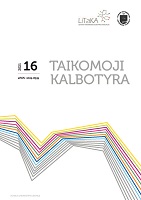Translating perception metaphors: Linguistic, cultural and social implications
Translating perception metaphors: Linguistic, cultural and social implications
Author(s): Anu KaldaSubject(s): Semantics, Cognitive linguistics, Translation Studies
Published by: Vilniaus Universiteto Leidykla
Keywords: translation process; translator; metaphor; context; cognitive linguistics;
Summary/Abstract: Explaining the process of translation has become a challenging aim for different research fields. Rather than just relying on the analysis of translated texts, it is vital to analyse the process of translation: what are the reasons behind the translator’s choices and what are the factors that influence the process? This article uses data from three experiments involving a total of 102 participants, who were asked to translate English perception metaphors into Estonian. The empirical results indicate that there are different factors that either hinder or enable translation. Most importantly, context supports the translating of both cross-cultural and culture-specific metaphors. Also, previous translation experience helps participants deal with metaphoric language. Another salient factor was living in an English-speaking country: participants with such experience found it less challenging to translate metaphoric language even if the metaphors were novel. Finally, educational background in translating facilitates the translation of metaphors.
Journal: Taikomoji kalbotyra
- Issue Year: 2021
- Issue No: 16
- Page Range: 86-109
- Page Count: 25
- Language: English

